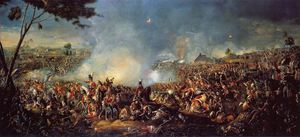Hundred Days
Coalition victory, Second Treaty of Paris
The Hundred Days (French: les Cent-Jours IPA: [le sɑ̃ ʒuʁ]), marked the period between Napoleon's return from exile on the island of Elba to Paris on 20 March 1815 and the second restoration of King Louis XVIII on 8 July 1815 (a period of 111 days). This period saw the War of the Seventh Coalition, and includes the Waterloo Campaign, the Neapolitan War as well as several other minor campaigns. The phrase les Cent Jours (the hundred days) was first used by the prefect of Paris, Gaspard, comte de Chabrol, in his speech welcoming the king back to Paris on 8 July.
Napoleon returned while the Congress of Vienna was sitting. On 13 March, seven days before Napoleon reached Paris, the powers at the Congress of Vienna , and on 25 March Austria, Prussia, Russia and the United Kingdom, members of the Seventh Coalition, to put 150,000 men each into the field to end his rule. This set the stage for the last conflict in the Napoleonic Wars, the defeat of Napoleon at the Battle of Waterloo, the restoration of the French monarchy for the second time and the permanent exile of Napoleon to the distant island of Saint Helena, where he died in May 1821.
...
Wikipedia

